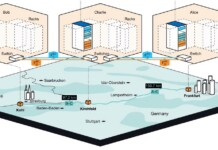Despite hardships from Covid, drought, heatwaves, wildfires, and resurgent inflation, three in five Americans say they are pretty happy with their lot, according to the latest Gallup Live Evaluation Index.

The percentage of Americans who evaluated their lives to be ‘thriving’ reached 59.2% in June, the highest in over 13 years of ongoing measurement—and exceeding the previous high of 57.3% from September 2017.
During the initial COVID-19 outbreak and economic shutdown, the thriving percentage plunged nearly 10 percentage points to 46.4% by late April 2020, tying the record-low measured during the recession that began in 2008.
The June 2021 results are based on 4,820 U.S. adults surveyed online as a part of the Gallup Panel, a probability-based, non-opt-in group of about 120,000 adults across all 50 states and the District of Columbia.
For its Index, Gallup classifies Americans as “thriving,” “struggling” or “suffering” according to how they rate their current and future lives on a scale from 0 to 10. Those who rate their current life a 7 or higher, and their anticipated life in five years an 8 or higher, are classified as thriving.
RELATED: 7 in 10 Americans Agree That 2020 Made Them a Better Person – Here’s How
The percentage of Americans estimated to be “suffering” has remained steadily low throughout the pandemic and in line with pre-COVID estimates, said Gallop in a news release. In June, just 3.4% of respondents were classified as suffering, according to their own assessments.
The major drop in the thriving percentage last year was characterized by a severe drop in current life satisfaction ratings. By late April, the percentage of U.S. adults who rated their current lives a “7” or higher had plunged about 11 percentage points, even as the anticipated life satisfaction five years forward had improved.
“The rapid recovery of current life satisfaction, coupled with the sustained elevated level of anticipated life satisfaction, has fueled the thriving percentage to its current heights.”
Spikes in Daily Stress and Worry Retreated to Pre-COVID Levels
In addition to the general life ratings, Gallup tracks whether Americans have recently experienced specific emotions, including stress and worry, in their daily lives.
The percentage of people who reported experiencing significant stress and worry “a lot of the day yesterday” showed unprecedented increases at the beginning of the pandemic, with stress rising 14 percentage points to 60% and worry rising 20 points to 58%.
Reports of experiencing these emotions have subsequently fallen to pre-pandemic levels in both cases.
Significant daily enjoyment has also markedly improved. In 2018-2019, about 80% of U.S. adults reported significant enjoyment the day before, which plunged to 61% at the onset of the pandemic. By June, enjoyment was back up to 73% of the adult population.
More than being a result of the vaccination rollout or improving economic conditions, the authors of the study theorize that the happiness boom was a result of the critical psychological benefit of renewed social interaction.
Reuniting in person with family and friends and joining in large gatherings of people such as at sporting events is a crucial part of social wellbeing. Past research has shown that those who spend six to seven hours a day in social time experience about one-fifth the stress and worry on any given day as those with no social time at all. These effects are likely on display as the levels of these negative emotions have improved to pre-pandemic levels in recent months.
RELATED: People are Making Self-Care a Priority After One of the Most Stressful Years Ever
It just goes to show: life’s ups are more powerful after you’ve been through the downs.
SHARE Your Own Satisfaction By Sharing This on Social Media…




















